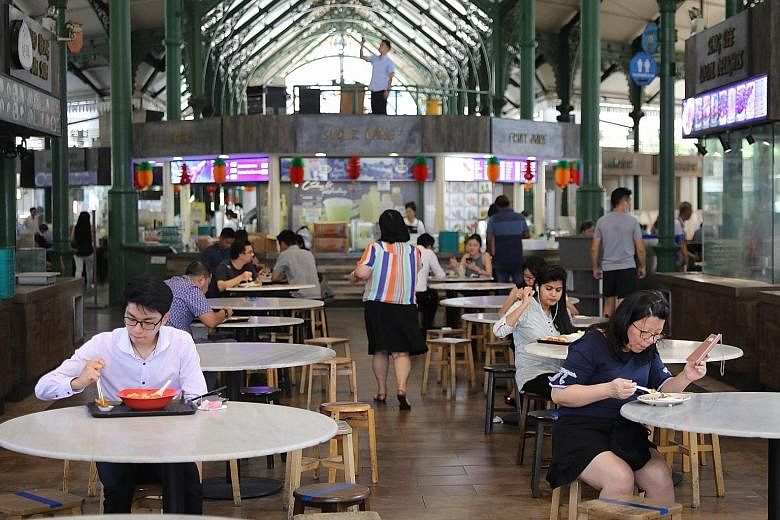Amid the gleaming skyscrapers, the streets in the Central Business District (CBD) seemed much quieter yesterday, very unlike the hustle and bustle of a normal workday.
Instead of the huge crush of smartly dressed office workers during the midday lunch break, there were just pockets of people heading out for their meals when The Straits Times visited the area.
Popular lunch spots near Cross Street, Boon Tat Street and Robinson Road were less than half full, partly due to marked seats for social distancing.
Short queues could be seen at salad joints and quick-service restaurants at places such as One Raffles Place and Republic Plaza, but service staff at food and beverage outlets there told The Straits Times that the crowds had been thinning since early last month.
More customers were also ordering takeaway instead of eating in, they said.
On Tuesday, Manpower Minister Josephine Teo announced that the ministry would come down harder on companies which have not made serious effort to put in place work-from-home arrangements.
Yesterday, changes to the Infectious Diseases Act were gazetted to mandate employers to implement telecommuting arrangements unless they are not feasible, and to adopt safe distancing measures at workplaces. Those found to have violated the law can be fined up to $10,000 or jailed up to six months, or face both penalties.
The Manpower Ministry estimated that only 40 per cent of workers in firms in the CBD are telecommuting. CBD workers told The Straits Times that their companies already had remote working arrangements in place. While some firms have split-team operations with weekly rotations between teams, others are ramping up on telecommuting, especially from this week.
Ms Tan Chor Chia, 40, a senior manager at a professional services firm, said her company's remote working arrangement began when the Disease Outbreak Response System Condition level was raised to "orange" on Feb 7.
She works from home most of the time unless she needs to have discussions in the office or attend interviews.
She added that the small size of her team made working arrangements more flexible for her and her teammates. "But now with the new measures, more people will work from home," Ms Tan said.
Mr Max Loh, EY's managing partner for Singapore and Brunei, said its more than 3,500 employees in Singapore are encouraged to telecommute as much as possible.
"Given that the nature of our business is such that in normal circumstances, our people work from anywhere all the time... we do not actively track the percentage of people telecommuting, but we can see the vast majority doing so."
Deloitte Singapore chief executive Cheung Pui Yuen said the firm started a split-team arrangement on Feb 12, with weekly rotations between two teams. It stepped up measures on March 23, when employees were given the option to work from home if they were not required to physically be in the office.
More than 80 per cent of Deloitte's 2,600 employees here are currently working remotely.
Mr Cheung added: "We are taking this time to experiment and observe the efficiency of these new work arrangements. This could very well be the defining moment in the way we work as a firm, moving forward."
Law firms such as Baker McKenzie Wong & Leow, Drew & Napier and Dentons Rodyk, and insurers such as Tokio Marine and Prudential, have the majority of their staff working remotely.
But these firms have retained skeletal teams in the office for administrative and essential matters such as dispatching secure documents.
Tokio Marine chief marketing officer Gilbert Pak said: "For employees who wish to avoid travelling during peak hours, they can work out with their managers to stagger their start and end times within the team."
A 62-year-old human resources officer at an enrichment company, who wanted to be known only as Mr Chen, said the firm began implementing a procedure in mid-February for employees to log their visits when they go to the office.
"They are told that they should work from home unless they need to come to the office, for which they have to check with their managers beforehand," he said.
At Lau Pa Sat yesterday, office workers were seen practising safe distancing, but the marking scheme for tables and chairs appeared haphazard.
Some tables were marked, but not chairs, while the reverse was true at other spots. The moveable chairs also meant that some four-seater tables ended up with one marked chair and three unmarked ones.
But it was more orderly at Market Street Interim Hawker Centre, where most groups were seen practising safe distancing.
Mr Reuben Foo, 30, who works at commodity trading firm Mercuria Energy, said his firm has a weekly rotating remote working arrangement. He added that while it was necessary for some to remain in the office, the majority of staff should stay at home. "I don't want to go out and spread anything to (my elderly parents) when I come (home)," he said. "The more Singaporeans stay at home, the better off we will be."
- Additional reporting by Joanna Seow

